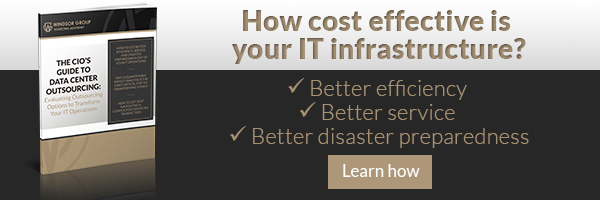 Your enterprise may be similar to other large global companies in many respects, but it’s actually a unique organism. Pre-set formulas or “solution templates” may have some value for guiding IT planning, but they can’t possibly tell the whole story when it comes to determining what’s best for you.
Your enterprise may be similar to other large global companies in many respects, but it’s actually a unique organism. Pre-set formulas or “solution templates” may have some value for guiding IT planning, but they can’t possibly tell the whole story when it comes to determining what’s best for you.
Hiring an outsourcing consultant can help you pull together everything you need and sharpen your focus. They can determine what’s best for your enterprise, but they don’t work alone. Their job is to support you in finding the right course of action for your company.
How do they do that?
They’ll start by getting to know you, your key people and your company. That’s why it’s imperative to choose a consultant who’s personally familiar with your type of IT environment and your industry. Someone with hands-on experience in both IT and overall business management won’t waste your time getting up to speed.
The broad perspective they bring to your project can dramatically improve the outcomes of your work together, and it will ensure important-but-subtle details don’t go overlooked.
They’ll arrange a personal meeting.
Many CIOs and CEOs are surprised to learn that the majority of outsourcing failures are due to poor working relationships, not performance issues. The same is true for working with an outsourcing consultant. Face-to-face meetings establish rapport and help your outsourcing consultant get an initial feel for your enterprise, but much of their ensuing work can be handled remotely, to save you time and money.
They’ll help you perform an IT assessment.
This is the foundation of effective IT transformation. If your baseline assessment is off, your assumptions and every decision you make will be off, too. The goal is to build a fully accurate, comprehensive business case that considers both functionality and financials. Your outsourcing consultant has the tools and know-how to ensure you leave nothing to chance.
As part of the assessment process, your consultant will help you look at company-specific internal business drivers and cultural factors, because the “flavor” of your organization helps shape the solution that’s best for you. They’ll help you uncover potential challenges surrounding transformation acceptance or transition.
They’ll help you consider staffing implications, too. What IT staff you retain will depend on what is not outsourced. Your provider may be able to absorb your key people as part of your contract, but the most important question is how you can most effectively redirect retained IT expertise to creatively approach long-term corporate planning or using new technologies to expand your revenue stream.
And of course your consultant will discuss your financial goals, whether your focus is reducing costs or optimizing current spending levels. That will help them recommend a pricing structure that’s best for you.
Moving past the theoretical.
Armed with all that factual data and an understanding of the intangible factors that are meaningful to your organization, your consultant will move you to the next stage – crafting the outsourcing deal that’s best for you. To do that, they’ll help you examine potential solution alternatives, providers and contract details.
This is one of the areas in which your consultant can really shine for you. The outsourcing marketplace offers a mind-boggling array of options, with more emerging seemingly every day. Thankfully, your consultant can zip you right past countless hours of research and confusion to zoom in on potential choices that make sense for your enterprise. You can review proven, viable options, not the entire outsourcing universe.
And your consultant won’t stop there. They’ll help you outline SLAs, performance metrics and an ongoing monitoring process so you can work smoothly with your chosen provider. In short, a consultant will ensure that every step of your outsourcing process is entirely customized, to assure that the choices you make are strategically sound and the service you get is 100% tailored to fit your needs.


